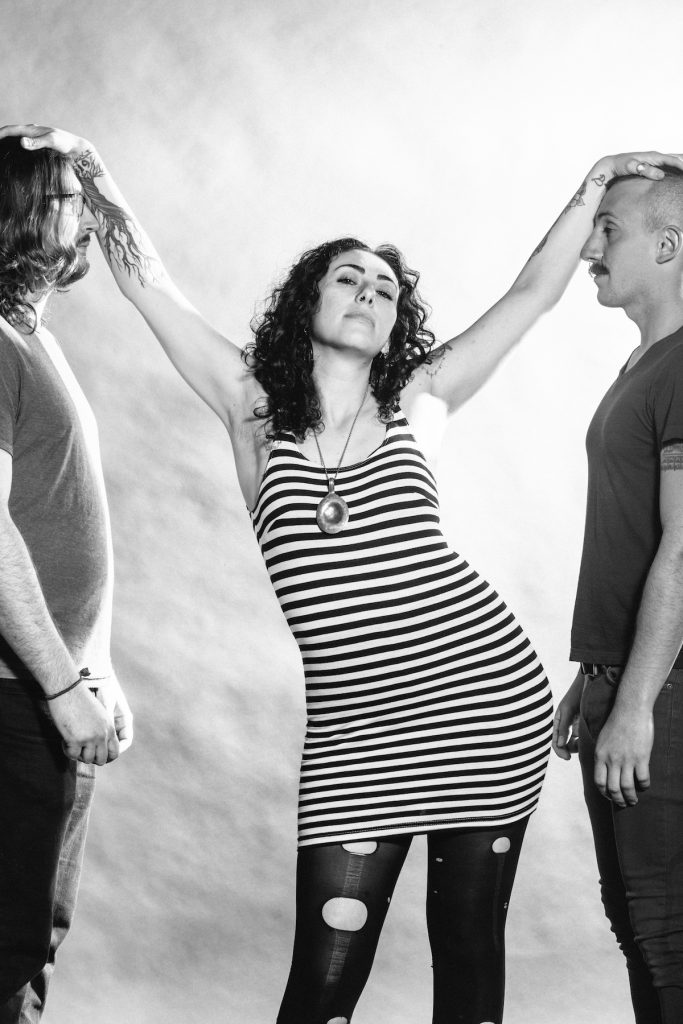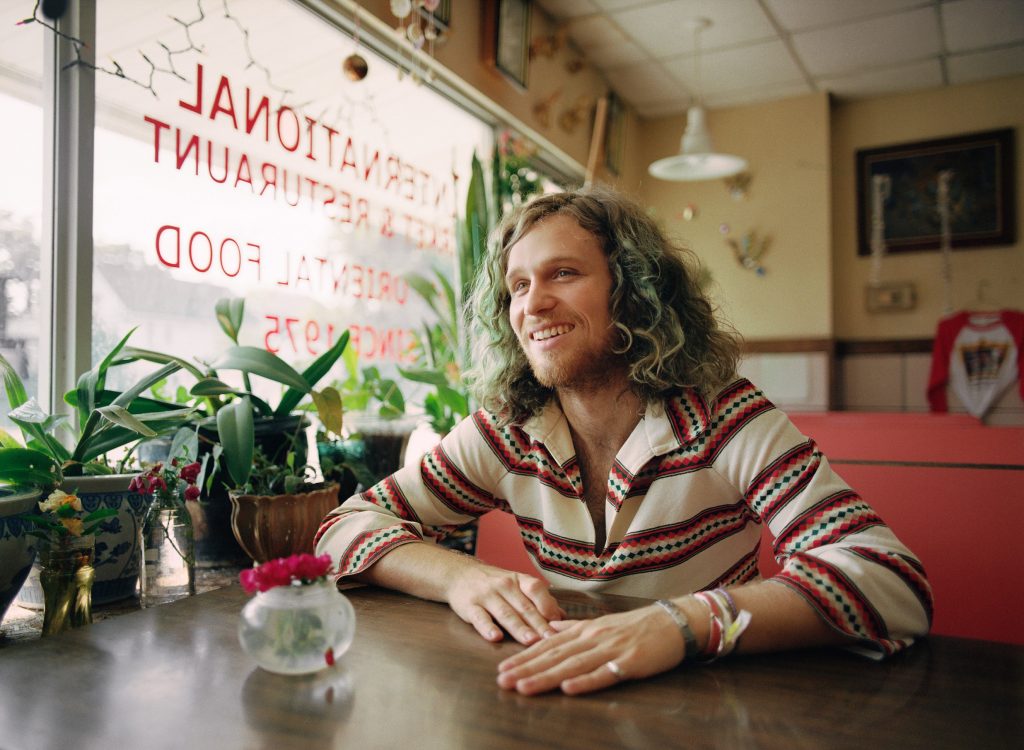
A COP CAR SPEEDS IN WITH ITS LIGHTS STROBING and stops a few spaces from where I’m sitting in the passenger’s seat of my car, transcribing an interview with Samantha Frances, the fiery, free-talking front woman of the rock ‘n’ roll band Frances and the Foundation. The cop’s high beams glare in so all I see is a shadow coming through the red, white, and blue lights. I have time to stash an open beer in the backseat and grab an Altoid before I have to open the door and explain myself.
I’m half in, half out of the car with my computer open to the transcript of my hour-plus conversation with Frances about her band’s forthcoming full-length record, Nothing is Perfect, Everything is Fine. We discuss the album and making music and a life in a gentrified city, Frances’ tenure singing backup vocals for Margo Price, sobriety and songwriting, ’90s music, and what it means to put work out now that Trump is president.
At 20:15, discussing “Bohemian Paradise,” one of the singles from the album: “It’s specifically about East Nashville. But if you go to any major city in the country right now, there’s something like that happening. People can identify with it just as much in Muncie, Indiana, as they can in Nashville . . . But I’m also making fun of myself because I moved here with a band and a boyfriend—and from a big city.”
At 32:28, about her sobriety: “I don’t mind talking about anything.”

At 36:40, on Nashville and making it: “I know a lot of people who’ve left town, or what happens is people stay but just stop playing music or they become part of the music business but they’re not artists anymore . . . I’m very lucky to have friends make it, including Margo [Price] and Brittany [Howard] from Alabama Shakes. Those people did what they came to do, although Brittany moved here after . . . The other side of that, I know people just as talented who own a business now or got married and they work an insurance job. And why it works out for one person and doesn’t for the next, I couldn’t tell you . . . I think part of it is just not quitting. I’m hoping that’s part of it, anyway, because I haven’t.”
At 39:53, in reference to the current commander in chief: “His presidency certainly affects me on multiple levels. He represents all the things that sort of hold women down.”
“What the hell are you doing here?” the cop asks me in the parking lot. “Didn’t you see the sign?”
“I’m trying to get some work done. I’m sorry,” I say.
All I have gotten down at this point, aside from coffee, half a beer, and some of the transcription, are some stray lines about the way Frances talks: direct, like a tattooer or a touring musician—she’s got this natural, honed style and looks you straight in the face with striking green eyes, smiles and means it, sips her tea. She’s a sober bartender who does what she has to do to continue making music, who tried other jobs after she quit drinking but nothing worked quite like bartending. “I have to be okay with this because this is the best possible job I can have to go along with what I’m trying to do with my life.”
It’s Sunday night, well past dark in the parking lot at the Cornelia Fort Airpark, and the cop is pissed. He tells me, “They all say it won’t happen again.” And he can’t understand why I’m on the passenger’s side, and didn’t I see the sign that reads Closed Dusk to Dawn?
Because of the steering wheel. And no, I lie, I didn’t see any signs. I have a newborn. I’m trying to get some work done. I point to the laptop and Zoom recorder and he demands my ID.
“IT’S A RESPONSE TO BEING TOLD YOU’RE TOO OLD TO DO SOMETHING. IT’S A RESPONSE TO BEING A WOMAN IN A FAIRLY MALE-DOMINATED GENRE AND BUSINESS AND TOWN AND WORLD.”
***
Frances, who cofounded the band with a longtime friend in 2011, has fronted a few different lineups over the years. The current trio consists of Frances on bass and lead vocals, with Nathan Zumwalt on guitar and Wes Cramer behind the drums. This iteration drives at a more syncopated, riff-driven sound that Frances seems to have had in mind since the start. “It’s become less pop, more rock—more progressive kind of—more aggressive rock,” she says. “It has a lot to do with drummers, but also me having more of the control. Before it was more evenly dispersed between me and my guitar player.”
The way she explains it, aggression is as much an aesthetic as a reaction. “It’s a response to a lot of things,” Frances says of her directness. “It’s a response to being told you’re too old to do something. It’s a response to being a woman in a fairly male-dominated genre and business and town and world, and blah, blah, blah. That’s a small piece of it, but I don’t like to linger on that. It’s a response to all of it. And, it’s just what I like.”
***
In her late teens Frances lost her parents to cancer and found herself in Seattle living with her older brother. He had received custody of their younger sister after their parents passed away. “I was eighteen and it was an option. I was like, Hell yeah, I’m out of here.” So she moved from Colorado Springs to Seattle in 2002, where, rather than attending college, as she had imagined she would, she dove into music.

“It’s kind of always been there. It’s kind of in our blood. It’s a very Jew-y thing,” she says and laughs. “We had a kiln and a pottery wheel in our garage, and we were always doing arts and crafts growing up.”
Those crafts at home grew into children’s choir, musical theater, bands, and backup singing for Margo Price among others. With each project Frances was trying to find something that fit. “What I really wanted to do was write my own songs, talk about my own stuff,” she says.
“I was pissed off . . . My parents both had cancer when I was young, so I grew up really fast, and my dad was an alcoholic . . . I had a dysfunctional childhood, I’ll just put it that way. My parents were very loving but fucked up. And they died young partially because of the way that they lived, which was another reason that I got sober, because I didn’t want to go down that same path.”
Eventually she was priced out of Seattle, and she moved to Nashville in 2006 with a band and a boyfriend and set up shop in East Nashville. Neither the band nor the boyfriend lasted long, less than a year in both cases. It was likely the culmination of breaking up, coming to terms with losing her parents, and going out to socialize with industry people that led to some of her more problematic drinking. “I was drinking before I moved here, but it really advanced fast when I moved to Nashville,” Frances says. She explains how in addition to the environment, drinking eventually accompanied her songwriting process.

“I wrote one really great song when I’d had two cups of wine and a couple hits of weed, and I was like, Oh, if I can just get back to that same magical spot again then I’ll write the best song ever. But it happened once. After that, every time I was going to try to write a song, I was always looking for that magical spot, and most of the time I would go way past it and wouldn’t finish the song. That’s why I sang backup for people for so long, because I couldn’t get anything of my own stuff together . . . I was at a very low level of functioning. Plus, I was unhappy and really hated myself more than anything. It was just time. I just knew.”
***
Maybe it’s my own search for that magic spot that draws me back to the airpark until this piece is finished. Each time with an Americano and tall can of beer. I sit shotgun and listen to Nothing is Perfect, Everything is Fine and watch people pour out of their cars in those last moments of sunlight to lap the park on bikes, rollerblades, on foot.
“Everyone has that [magic spot]. I’ve never met an artist who didn’t chase after that,” Frances says. “But that’s life, to some extent. You’re always chasing that one awesome time, wishing it could be like that again. Is your memory of it as real as what you’ve turned it into in your mind? No.”
One of the warmer nights I get out of the car to snap a picture of a Cornelia Fort quote engraved on a plaque at the entrance. “I am grateful that my one talent, flying, was useful to my country,” said the first female pilot to die on active duty in American history.
A few hipster families park and flood by me, pushing strollers out toward the Cumberland before the sun sets. It’s the kind of scene that you imagine inspired songs like “Bohemian Paradise.” These people probably live in the “plastic houses” Frances rails against. But we’re all part of the problem here, as Frances herself acknowledges. Eventually there’s just nowhere for people to be, to make art, because, as she says, “people get pushed out as things get revamped.”

Everything about Frances, from her howling songs to her quick and ready honesty, suggests that we don’t have time to not mean what we say. There’s no more room for or interest in indie rock irony.
“I don’t necessarily want to become Rage Against the Machine or a super political band,” she says about making art during the current administration. “Sometimes I think I’m just saying, Are you seeing this? Are you seeing what’s happening?”
Sometimes it seems like when you devote yourself to making something you run the risk of not making something of yourself. With Frances that isn’t true. There’s no discernible distance between her and her art, as both have grown in tandem. Now wiser and with a steady clarity that often seems to accompany sobriety, she has her message and her method, she has her sound, and she is useful.

“I try to be especially supportive of younger women who are in Nashville, and if they’re interested in advice about [making music], I’ve been here a long time and have made a bunch of mistakes . . . I want to create a community of people who support each other as much as I can.”
I stay at the airpark until just shy of dark listening to the record, reading back over Frances’ thoughts.
On rock ‘n’ roll and aggression today: “People need a way to release their frustration, so I think aggressive music is especially important right now. And for me, I want it to be aggressive but not necessarily angry or negative. Because I’m not really that angry or negative. I’m a lot less angry than I used to be, and I try hard to be positive. But that doesn’t mean I can’t be frustrated and show that. To me, it’s almost like showing women you can be frustrated, but you don’t have to be an asshole . . . It doesn’t have to manifest in an I’m-right-you’re-wrong way. We’re in this together. This is fucked up, but what can we do to solve it in an aggressively positive way?”
Nothing is Perfect, Everything is Fine will be out June 2, with a release show June 1 at The 5 Spot.



